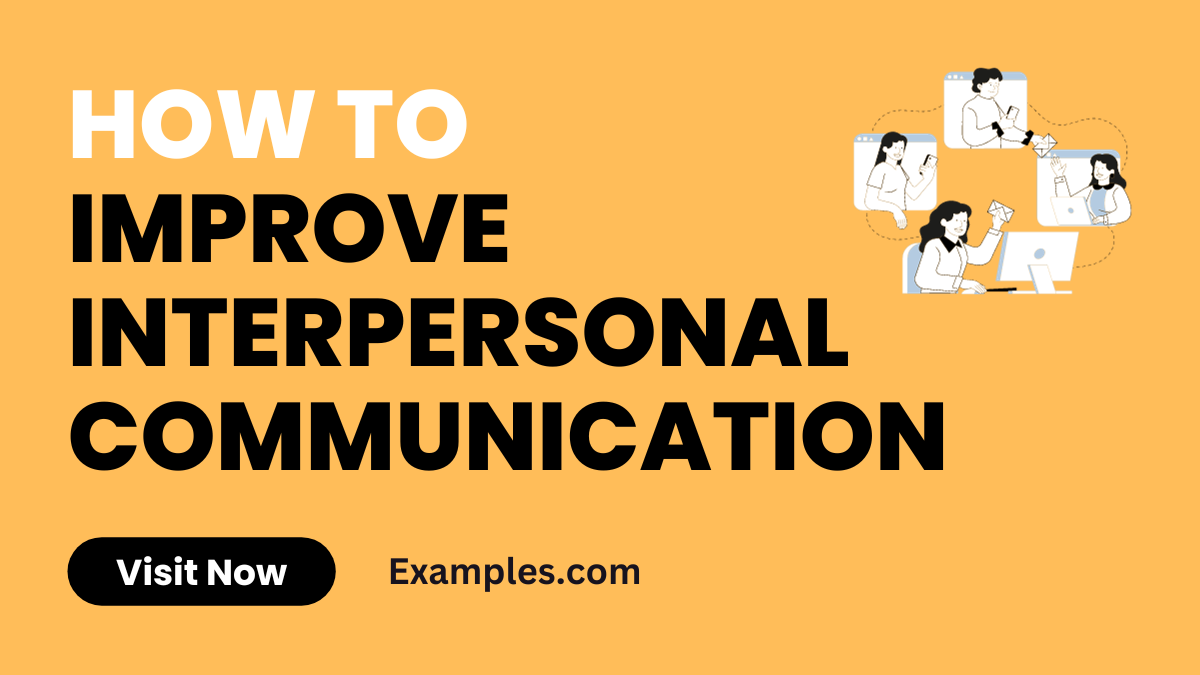How to Improve Interpersonal Communication?
Interpersonal communication is an essential skill in both personal and professional realms. This comprehensive guide delves into the core requirements for effective interpersonal interaction, offering practical insights and real-world interpersonal communication examples. From mastering verbal and non-verbal cues to understanding the subtleties of digital communication, we’ll explore how to navigate and enhance your communicative abilities. Whether you’re a student, professional, or simply seeking to improve your daily interactions, these insights will provide valuable tools for meaningful exchanges.
How to Improve Interpersonal Communication? – Definition
Improving interpersonal communication means enhancing how we interact and convey messages with others. It encompasses more than just verbal exchanges; it includes active listening, understanding non-verbal cues, and effectively expressing our thoughts and feelings. This skill is vital in every aspect of our lives, from personal relationships to professional environments. By incorporating elements like emotional expression in interpersonal communication and listening in interpersonal communication, we can build stronger, more meaningful connections. Good interpersonal communication leads to clearer, more empathetic, and productive interactions, essential for both personal and professional success.
10 Ways to Improve Your Interpersonal Communication
In our interconnected world, mastering the art of interpersonal communication is invaluable. This skillset is not just beneficial but essential in fostering strong personal and professional relationships. Effective communication facilitates understanding, builds trust, and creates a foundation for collaboration and cooperation. This guide outlines ten key strategies to boost your interpersonal communication abilities, incorporating aspects like verbal communication in interpersonal communication and listening in interpersonal communication. These methods are designed to enhance your interactions, whether in the boardroom, classroom, or living room. Understanding and applying these strategies will not only make you a better communicator but also help in developing deeper and more meaningful connections in all facets of life.
- Active Listening: Engaging fully with the speaker, understanding the emotions and intentions behind their words, and responding thoughtfully. Active listening is a cornerstone of effective interpersonal communication.
- Clear Verbal Communication: Expressing ideas and feelings clearly and concisely, avoiding ambiguity and misunderstanding. This is a vital component of verbal communication in interpersonal communication.
- Effective Non-Verbal Communication: Utilizing body language, facial expressions, and gestures to complement or emphasize verbal messages. Mastering this can greatly enhance the clarity and emotional depth of your interactions.
- Empathy: Understanding and sharing the feelings of others, fostering deeper connections and building trust in various communication contexts.
- Constructive Feedback: Giving and receiving feedback in a manner that is beneficial and considerate, essential for growth and improvement in interpersonal interactions.
- Conflict Resolution: Managing disputes effectively and respectfully, an important skill in maintaining healthy and productive relationships.
- Cultural Sensitivity: Being aware of and respectful towards cultural differences in communication styles, crucial in today’s globalized world.
- Self-Improvement: Continually working to improve one’s communication skills through learning and practice.
- Digital Communication Proficiency: Communicating effectively through digital mediums, a necessary skill in the modern age, where digital communication in interpersonal communication plays a significant role.
- Consistency: Maintaining a consistent communication style to build trust and reliability, important in all forms of interpersonal communication.
By focusing on these strategies, you can significantly enhance your interpersonal communication, leading to more successful and enriching interactions in every aspect of your life.
Goals to Improve Interpersonal Communication

Setting clear, achievable goals is a fundamental step in enhancing your interpersonal communication skills. These goals serve as a roadmap, guiding your efforts to become a more effective and empathetic communicator. Here are some key objectives to consider:
- Enhancing Listening Skills: Aiming to become an active listener, focusing not just on words, but on the tone, emotion, and underlying messages in conversations.
- Improving Clarity in Verbal Communication: Striving to express thoughts and ideas more clearly and concisely, reducing misunderstandings and enhancing the effectiveness of verbal exchanges.
- Developing Empathy: Working towards better understanding and sharing the feelings of others, which can lead to deeper and more meaningful interactions.
- Mastering Non-Verbal Cues: Learning to interpret and use body language, facial expressions, and other non-verbal signals to complement and reinforce verbal messages.
- Building Conflict Resolution Skills: Focusing on resolving disagreements in a constructive manner, maintaining positive relationships even in challenging situations.
- Enhancing Digital Communication: In today’s tech-driven world, improving skills for communicating effectively through digital channels is crucial.
- Cultural Sensitivity and Awareness: Cultivating an understanding of different cultural communication styles and adapting interactions accordingly.
Each of these goals contributes to the broader aim of becoming a more adept communicator, capable of building stronger, more resilient relationships in various aspects of life.
Tips for Improving Interpersonal Communication

Improving interpersonal communication is a continuous process that requires practice and dedication. Here are some practical tips to help you develop stronger communication skills:
- Practice Active Listening: Show genuine interest in what others are saying. Avoid interrupting and summarize their points to show understanding.
- Mind Your Body Language: Non-verbal cues like eye contact, gestures, and posture can significantly impact how your message is received.
- Be Clear and Concise: Aim for clarity in your verbal communication. Avoid using jargon or overly complex language that might confuse the listener.
- Develop Empathy: Try to see things from the other person’s perspective. This understanding can greatly enhance the quality of your interactions.
- Handle Conflicts with Maturity: Approach conflicts as opportunities for growth. Focus on finding solutions rather than assigning blame.
- Adapt to Your Audience: Tailor your communication style to suit the individual or group you are interacting with, considering factors like cultural background and personal preferences.
- Seek Feedback: Regularly ask for feedback on your communication style. Be open to criticism and use it as a tool for improvement.
- Engage in Continuous Learning: Read books, attend workshops, and seek mentorship in communication skills.
- Leverage Digital Tools Effectively: In a world where digital communication is ubiquitous, learn to communicate effectively through emails, social media, and other online platforms.
- Practice, Practice, Practice: Like any other skill, interpersonal communication improves with practice. Engage in conversations, participate in group discussions, and seize opportunities to refine your communication abilities.
By integrating these tips into your daily interactions, you can make significant strides in improving your interpersonal communication, meeting the varied requirements for interpersonal communication. This guide, optimized for the keyword “Requirements for Interpersonal Communication”, offers a comprehensive approach to developing these essential skills.
Steps to Improve Your Interpersonal Communication
Enhancing your interpersonal communication skills is essential in meeting the varied requirements for interpersonal communication. By following these structured steps, you can develop more effective and meaningful interactions in both personal and professional settings.
- Self-Assessment: Begin by critically assessing your current communication abilities. Consider areas like verbal communication in interpersonal communication and your effectiveness in non-verbal communication in interpersonal communication.
- Set Specific Goals: Establish clear objectives, such as improving your listening in interpersonal communication or becoming more adept at expressing emotions.
- Educational Enrichment: Engage in learning activities, including reading interpersonal communication books or participating in courses about types of interpersonal communication.
- Practice and Application: Implement your new knowledge in real-life scenarios. This can range from daily conversations to professional meetings, focusing on aspects like emotional expression in interpersonal communication.
- Seek Feedback and Reflect: Actively seek out feedback on your communication style and reflect on this input for continuous improvement.
- Adapt and Evolve: Be flexible in your communication approach, adapting to different situations and people as needed.
- Maintain Consistency: Consistency is key in ingraining these new skills into your communication style, making them a natural part of your interactions.
Strategies to Improve Interpersonal Communication

Adopting specific strategies can significantly enhance your ability to meet the requirements for interpersonal communication. These strategies are designed to improve your interaction skills in a variety of settings.
- Active Listening Strategy: Focus on improving listening in interpersonal communication. Active listening involves full engagement with the speaker, understanding their message, and responding thoughtfully.
- Empathy Building Strategy: Enhance your ability to empathize. This involves understanding and sharing the feelings of others, a vital aspect of emotional expression in interpersonal communication.
- Feedback Loop Strategy: Create a feedback loop with peers or mentors to continuously improve your communication skills, particularly in verbal communication in interpersonal communication.
- Non-Verbal Communication Focus: Give special attention to non-verbal communication in interpersonal communication. Understanding body language and facial expressions can significantly enhance your communication effectiveness.
- Conflict Resolution Techniques: Master conflict resolution, an important skill in maintaining healthy interpersonal relationships.
- Cultural Competence Strategy: Develop cultural sensitivity, understanding, and respecting the differences in communication styles across cultures.
- Digital Communication Adaptation: Adapt your skills to digital platforms, an increasingly important aspect of modern communication.
- Continuous Learning and Adaptation: Stay informed about the latest developments in types of interpersonal communication and continually apply these insights.
By integrating these steps and strategies into your daily communication practices, you will be well-equipped to meet the diverse requirements for interpersonal communication. This approach will not only enhance your personal and professional interactions but also contribute to your overall growth as an effective communicator.
In conclusion, mastering interpersonal communication is pivotal for thriving in both personal and professional spheres. By embracing strategies like active listening and empathetic engagement, and by applying practical tips from this guide, you can significantly enhance your communication skills. Remember, effective interpersonal communication is a continual journey of learning, practicing, and refining.



